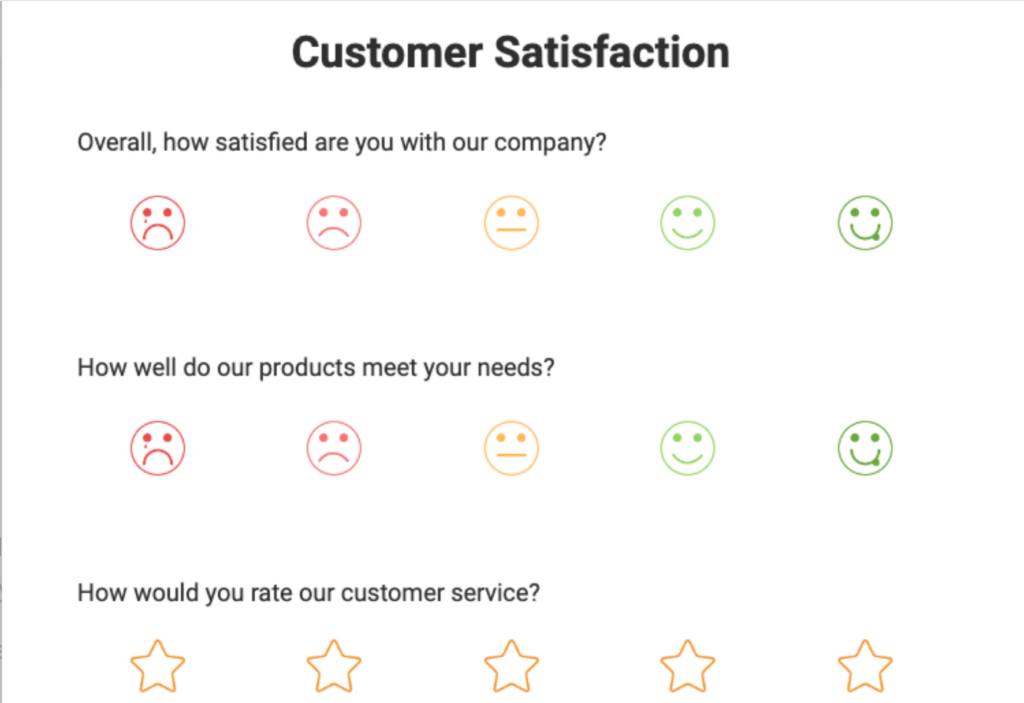
We all crave feedback. Whether it’s a chef yearning for reviews on their latest culinary creation or an athlete seeking pointers to improve their game, feedback helps us grow and excel.
Have you ever wondered exactly what you could do to meet customers, employees’, or clients expectations perfectly? I bet you have, and there’s a really simple way—feedback survey questions, of course!
This guide is all about feedback surveys, their advantages, and how to create them, along with 50+ example questions from different feedback surveys.
What Is a Feedback Survey?
A feedback survey is a tool designed to collect opinions, suggestions, and insights from respondents. It allows businesses, organizations, and individuals to understand how people perceive their products, services, or experiences.
Watch: How to Measure Customer Satisfaction with ProProfs Survey Maker: Quick & Easy
Feedback surveys are structured to ask targeted questions that reveal areas for improvement, identify trends, and measure satisfaction. These surveys can take various forms, including customer feedback, employee engagement, training evaluations, and more, each with specific goals and question types.
By asking the right questions, you can uncover valuable information about:
- Satisfaction levels: Are your customers happy with your products? Are your employees satisfied with their work environment?
- Areas for improvement: What can you do to enhance your offerings and meet the needs of your audience?
- Strengths and weaknesses: What are you doing well, and where do you need to focus your efforts?
- Perceptions and expectations: How do people perceive your brand, and what are their expectations for the future?
What Are the Advantages of Feedback Surveys?
Feedback surveys provide several advantages for businesses and organizations looking to improve their services or products. Here are some key benefits:
- Uncover Hidden Issues: Feedback surveys allow you to spot problems before they escalate. They reveal pain points that might go unnoticed in day-to-day operations.
- Enhance Customer Satisfaction: By collecting feedback, you understand customer preferences better, helping to fine-tune products or services and increase customer satisfaction.
- Improve Employee Engagement: Surveys help you gather insights into employee morale, job satisfaction, and work environment, which are essential for keeping a happy, productive team.
- Measure Success: Feedback surveys give you measurable data on how successful your initiatives are, from events to training programs.
- Drive Innovation: When you listen to feedback, you open up the possibility for new ideas and improvements that can drive your business forward.
- Boost Customer Loyalty: When customers see that you value their opinion and are taking action based on their feedback, it strengthens their loyalty to your brand.

Examples of Feedback Survey Questions
Feedback surveys are essential for understanding how your customers feel about your products, services, and overall experience.
By asking the right mix of questions, you can gain valuable insights that help improve satisfaction, address concerns, and build stronger relationships.
Below are some examples of key questions to guide your feedback collection and drive meaningful change.
A. Customer Satisfaction Surveys
Customer satisfaction surveys help organizations gauge their clients’ experiences and perceptions.
1. How satisfied are you with our service? (Rating scale: 1-5)
-
- 1 – Very Dissatisfied
- 2 – Dissatisfied
- 3 – Neutral
- 4 – Satisfied
- 5 – Very Satisfied
2. What specific features do you value the most? (Open-ended)
3.How likely are you to recommend us to a friend or colleague? (NPS question)
-
- 0-6 (Not likely)
- 7-8 (Neutral)
- 9-10 (Very likely)
4. How did you first hear about us? (Multiple choice)
-
- Social media
- Referral
- Online search
- Other (please specify)
5. What improvements would enhance your experience with us? (Open-ended)
B. Employee Feedback Surveys
Gathering feedback from employees can provide insights into workplace satisfaction and areas for improvement.
1. How satisfied are you with your current role? (Rating scale: 1-5)
-
- 1 – Very Dissatisfied
- 2 – Dissatisfied
- 3 – Neutral
- 4 – Satisfied
- 5 – Very Satisfied
2. What motivates you to excel in your role?
(Open-ended)
3. Do you feel your contributions are recognized?
(Yes/No)
4. How would you rate communication within the team?
(Likert scale: Poor to Excellent)
5. What suggestions do you have for improving team dynamics?
(Open-ended)
C. Event Feedback Surveys
Event feedback surveys gather insights from participants about their experiences and satisfaction levels.
1. How satisfied were you with the event overall? (Rating scale: 1-5)
-
- 1 – Very Dissatisfied
- 2 – Dissatisfied
- 3 – Neutral
- 4 – Satisfied
- 5 – Very Satisfied
2. What was your favorite aspect of the event?
(Open-ended)
3. Would you attend another event like this in the future?
(Yes/No)
4. How would you rate the quality of the speakers?
(Rating scale: 1-5)
5. What topics would you like to see covered in future events?
(Open-ended)
D. Training Evaluation Surveys
Training evaluation surveys help assess the effectiveness of training programs.
1. How relevant was the training content to your role? (Rating scale: 1-5)
-
- 1 – Not Relevant
- 2 – Somewhat Relevant
- 3 – Neutral
- 4 – Relevant
- 5 – Very Relevant
2. What did you like most about the training?
(Open-ended)
3. How likely are you to apply what you learned in your work? (NPS question)
-
- 0-6 (Not likely)
- 7-8 (Neutral)
- 9-10 (Very likely)
4. What additional training topics would you find beneficial?
(Open-ended)
5. How would you rate the trainer’s effectiveness?
(Rating scale: 1-5)
E. Employee Engagement Surveys
Employee engagement surveys assess how committed and motivated employees are within their roles.
1. How engaged do you feel in your work? (Rating scale: 1-5)
-
- 1 – Not Engaged
- 2 – Somewhat Engaged
- 3 – Neutral
- 4 – Engaged
- 5 – Very Engaged
2. What motivates you to stay with the company?
(Open-ended)
3. Do you feel you have opportunities for professional growth?
(Yes/No)
4. How would you rate your work-life balance?
(Likert scale: Poor to Excellent)
5. What changes would improve your engagement at work?
(Open-ended)
F. Social Media Surveys
Social media surveys help organizations gather feedback from their audience regarding their online presence and engagement.
1. How often do you engage with our social media content? (Multiple choice)
-
- Daily
- Weekly
- Monthly
- Rarely
- Never
2. What type of content do you prefer? (Check all that apply)
-
- Videos
- Articles
- Infographics
- Interactive posts
- Other (please specify)
3. How would you rate our social media presence?
(Rating scale: 1-5)
4. What platforms do you primarily use to follow us? (Multiple choice)
-
- Other (please specify)
5. What improvements would you suggest for our social media strategy?
(Open-ended)
G. Volunteer Feedback Surveys
Volunteer feedback surveys gather insights from volunteers about their experiences, motivations, and satisfaction.
1. How satisfied are you with your volunteer experience? (Rating scale: 1-5)
-
- 1 – Very Dissatisfied
- 2 – Dissatisfied
- 3 – Neutral
- 4 – Satisfied
- 5 – Very Satisfied
2. What motivated you to volunteer with us?
(Open-ended)
3. Do you feel appreciated for your contributions?
(Yes/No)
4. How would you rate the training and support you received?
(Rating scale: 1-5)
5. What challenges did you face during your volunteering?
(Open-ended)
H. Client Feedback Survey Questions
Client feedback surveys are essential for understanding the satisfaction and needs of clients in professional settings.
1. How satisfied are you with our services? (Rating scale: 1-5)
-
- 1 – Very Dissatisfied
- 2 – Dissatisfied
- 3 – Neutral
- 4 – Satisfied
- 5 – Very Satisfied
2. How well did we meet your expectations?
(Likert scale: Poor to Excellent)
3. What aspects of our service do you appreciate the most?
(Open-ended)
4. How likely are you to recommend us to other businesses? (NPS question)
-
- 0-6 (Not likely)
- 7-8 (Neutral)
- 9-10 (Very likely)
5. What improvements can we make to better serve you?
(Open-ended)
I. Meeting Survey Feedback Questions
Meeting feedback surveys help you assess the effectiveness of meetings, gather participant input, and improve future meetings.
1. How effective was this meeting in achieving its objectives? (Rating scale: 1-5)
-
- 1 – Very Ineffective
- 2 – Ineffective
- 3 – Neutral
- 4 – Effective
- 5 – Very Effective
2. What aspects of the meeting did you find most valuable?
(Open-ended)
3. How would you rate the length of the meeting?
(Likert scale: Too Short to Just Right)
4. Did the meeting start and end on time?
(Yes/No)
5. What improvements would you suggest for future meetings?
(Open-ended)
How to Create Feedback Surveys in Simple Steps
Creating an effective feedback survey involves several key steps. Before discussing them in-depth, let’s watch a quick and easy visual representation of the steps:
Watch: How to Create Engaging Surveys Online with ProProfs Survey Maker – Free & Easy
- Define Your Objectives: Clearly outline what you want to achieve with the survey. Are you measuring customer satisfaction, employee engagement, or event feedback?
- Choose the Right Questions: Use a mix of feedback survey questions, including customer feedback survey questions, feedback questions for employees, and feedback form questions for students, to gather diverse insights. Avoid leading questions and ensure clarity.
- Keep it Short and Simple: Aim for brevity to increase response rates. A survey that takes less than 10 minutes to complete is generally ideal.
- Test Your Survey: Before launching, test the survey with a small group to identify any issues with clarity or technical problems.
- Distribute Your Survey: Share your survey through various channels, such as email, social media, or your website. Make sure it’s accessible to your target audience.
- Analyze the Data: Use analytics tools to evaluate the results. Look for trends, strengths, and areas for improvement.
- Act on the Feedback: Share findings with relevant stakeholders and implement changes based on the insights gathered to improve the overall experience.
- Follow-up: Thank respondents for their feedback and keep them updated on changes made as a result of their input. This shows that you value their opinions.
Fine Tune Your Products or Services With the Right Feedback Survey Questions
Feedback surveys are invaluable tools for gathering insights that can transform your organization, improve customer satisfaction, and enhance employee engagement. By asking the right feedback survey questions, whether they pertain to customer satisfaction, employee experience, or event success, you can obtain the information necessary to make informed decisions.
Incorporating diverse question formats and tailoring your surveys to fit the specific context will ensure you receive meaningful responses. Don’t forget to act on the feedback and communicate back to your audience about the changes you’re implementing based on their input.
If you’re looking for a streamlined way to create feedback surveys, consider using ProProfs Survey Maker. This tool provides customizable templates and an easy-to-use interface to help you gather insights that matter most to your business.
Start creating your feedback surveys today and take the first step toward better understanding your audience!
FREE. All Features. FOREVER!
Try our Forever FREE account with all premium features!







